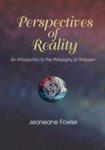
Book Summary
This book is an introduction to the six major orthodox schools of philosophical thought in Hinduism, known as the orthodox darsanas. These six schools of thought are concerned with the nature of reality and it is this theme which unites them. The book analyses the concept of knowledge, and what constitutes real knowledge, as it is perceived by the six schools. The nature of reality has always remained crucially important within the traditions of Hinduism: indeed, since the means to Ultimate Reality are the means to enlightenment, then understanding the nature of reality is tantamount to understanding the nature of the Ultimate Truth behind the universe -- the goal to which the individual aspires. Contents include: -- Systems of belief: monism; advaita; theism; monotheism; polytheism; pantheism; panentheism; dualism; pluralism. -- The nature of reality: 1 Knowledge -- What is it to know? What can be known? What kinds of knowledge are there? How is knowledge acquired? 2 Causality -- the relationship between causes and their effects. 3 The self -- the illusory self; the ego; the real self. 4 The divine -- as ultimate reality; as ultimate cause; in relation to the world; in relation to what is known; in relation to the self. -- Veda and Vedanta -- The philosophical school of Mimamsa -- Nyaya -- Vaisesika -- Classical Samkhyo and the Samkhyo of the Bhagavad Gita -- The Yoga Sutras of Patanjali -- Sankara's Advaita Vedanta -- The Visistadvaita of Ramanuja -- The Dvaita of Madhva
Book Details
| Book Name | Hinduism: Perspectives Of Reality |
| Author | Jeaneane Fowler, Fowler |
| Publisher | Sussex Academic Press (Sep 2002) |
| ISBN | 9781898723936 |
| Pages | 460 |
| Language | English |
| Price | 3557 |








